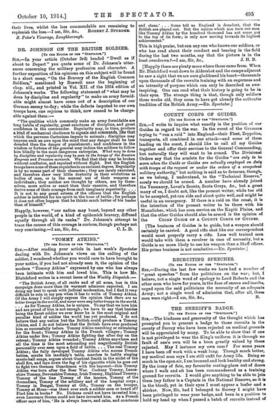DR. JOHNSON ON THE BRITISH SOLDIER. [To Tax EDITOR 01
THE " SPRCTATOR."]
Sin,—In your article (October 3rd) headed " Dwell as if about to Depart" you quote some of Dr. Johnson's utter- ances concerning the military profession and character. A further exposition of his opinions on this subject will be found in a short essay, "On the Bravery of the English Common Soldiers," mentioned by Boswell near the beginning of chap. xiii., and printed in VoL XII. of the 1824 edition of Johnson's works. The following statement of " what may be done by discipline and regularity" to make an army formid- able might almost have come out of a description of our German enemy to-day ; while the defects imputed to our own troops have, one rejoices to think, now ceased to be charge- able against them:—
" The qualities which commonly make an army formidable are long habits of regularity, great exactness of discipline, and great confidence in the commander. Regularity may, in time, produce a kind of mechanical obedience to signals and commands, like that which the perverse Cartesians impute to animals ; discipline may impress such an awe upon the mind that any danger shall be less dreaded than the danger of punishment ; and confidence in the wisdom or fortune of the general may induce the soldiers to follow him blindly to the most dangerous enterprise. What may be done by discipline and regularity may be seen in the troops of the Russian Empress and Prussian monarch. We find that they may be broken without confusion, and repulsed without flight. But the English troops have none of these requisites in an eminent degree. Regularity is by no means part of their character ; they are rarely exercised, and therefore show very little dexterity in their evolutions as bodies of men, or in the manual use of their weapons as individuals; they neither are thought by others, nor by them- selves, more active or exact than their enemies, and therefore derive none of their courage from such imaginary superiority. . . . It is not to any great esteem of the officers that the English soldier is indebted for his spirit in the hour of battle ; for perhaps it does not often happen that he thinIcq much better of his leader than of himself."
Happily, however, "our nation may boast, beyond any other people in the world, of a kind of epidemick bravery, diffused equally through all its ranks." Dr. Johnson's attempt to trace the causes of this courage is curious, though perhaps not
very convincing.—I am, Sir, &c., C. L. D.


































 Previous page
Previous page